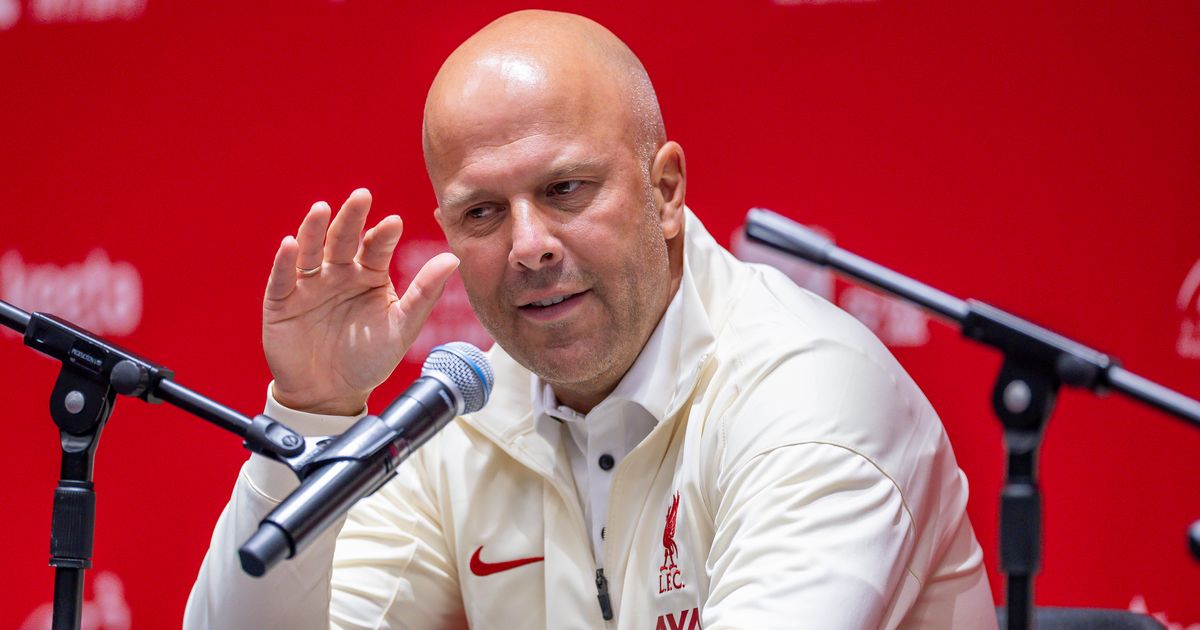Arne Slot press conference LIVE – Liverpool transfers and injury news updates

The morning of August 14, 2025, brought with it the familiar buzz of anticipation at Liverpool’s AXA Training Centre. Journalists gathered in the modern media facility, their notebooks and recording devices ready to capture every word from Arne Slot, the Dutch tactician who had successfully guided Liverpool to their second Premier League title in just over five years. The defending champions were mere hours away from beginning what many considered their most challenging title defense yet, with Friday evening’s clash against Bournemouth marking the official start of what promised to be an enthralling 2025-26 Premier League campaign.
The atmosphere was charged with expectation. Slot, who had arrived slightly later than his usual punctual timing, carried himself with the quiet confidence that had become his trademark since taking the reins at Anfield. His previous week’s press conference had been characterized by diplomatic responses regarding transfer speculation, but with significant developments occurring behind the scenes, particularly concerning young Italian defender Giovanni Leoni, there was hope among the assembled media that the Liverpool boss might be more forthcoming about his squad’s evolving composition.
The significance of this particular press conference extended beyond mere match preparation. Liverpool’s journey to reclaim the Premier League crown had been nothing short of spectacular, and now the challenge was to prove that their success was not merely a flash in the pan but the foundation of a sustained period of dominance. With Manchester City, Arsenal, and other traditional rivals having significantly strengthened their squads during the summer transfer window, the task ahead appeared more daunting than ever.
The most pressing topic on everyone’s mind was the club’s transfer activity, particularly the imminent arrival of Giovanni Leoni. The 18-year-old Italian center-back had been granted permission to undergo his medical examination at Liverpool’s state-of-the-art facilities, with a £26 million agreement already reached with Parma. Unlike many young signings who are immediately loaned out for development, Leoni was earmarked for immediate first-team integration, a testament to both his exceptional talent and Liverpool’s confidence in his ability to adapt to the Premier League’s demanding environment.
Slot’s comments regarding the young defender were measured but revealing. “The clubs have agreed a deal but he hasn’t signed,” he explained with characteristic caution. “The moment he signs I can go into more detail.” This diplomatic approach reflected the manager’s understanding of the delicate nature of transfer negotiations, even when deals appear to be all but concluded. The significance of Leoni’s potential arrival could not be understated, particularly given Liverpool’s defensive concerns that had surfaced during pre-season friendlies and the Community Shield defeat to Crystal Palace.
The pursuit of Crystal Palace captain Marc Guehi remained another significant storyline. Slot’s response to questions about the England international was equally guarded but telling in its consistency. “The other one is the same answer I always give,” he stated. “Can I talk more? No, he is not our player, unfortunately he was the captain of the team we lost against. If you want to talk about him, go to Glasner and Palace and ask them.” The reference to Palace’s Community Shield victory served as a pointed reminder of the defensive vulnerabilities that had prompted Liverpool’s interest in the center-back.
The speculation surrounding Newcastle United’s Alexander Isak continued to swirl, though Slot remained characteristically tight-lipped about the club’s pursuit of the Swedish striker. The manager’s reluctance to discuss specific targets had become a hallmark of his press conferences, reflecting both his professionalism and his understanding of the complex dynamics involved in modern transfer negotiations.
Liverpool’s defensive record during pre-season had been a source of considerable discussion among fans and pundits alike. The Community Shield defeat to Crystal Palace had highlighted several areas of concern, particularly in transition moments and set-piece defending. Slot addressed these issues with his typical analytical approach, acknowledging the challenges while maintaining confidence in his squad’s ability to improve.
“Don’t forget we missed Mac Allister in parts of last season and barely played pre-season, only recently,” Slot explained, referencing the Argentine midfielder’s limited involvement due to Copa America commitments. “Not that I am not happy about parts, it is just the standard here is 10/10. We do things well but ‘well’ is not good enough. We need to step up in certain aspects.”
This perfectionist mentality encapsulated Slot’s approach to management and his understanding of Liverpool’s expectations. The manager was quick to point out that pre-season performances often featured mixed teams and experimental lineups, which inevitably affected defensive cohesion and timing. However, he was equally clear that such factors would not serve as excuses once the competitive season began.
The absence of key players during pre-season had undoubtedly contributed to some of the defensive uncertainties. Virgil van Dijk’s illness, Alisson’s delayed return from international duty, and Alexis Mac Allister’s injury concerns had all disrupted the defensive unit’s preparation. Ryan Gravenberch’s suspension for the opening match further complicated matters, removing a crucial component of Liverpool’s midfield shield.
“Quality on the ball I am happy but 8/10 times off the ball is good but the aim at this club is 10/10 times,” Slot emphasized. This statistical approach to defensive performance reflected his meticulous attention to detail and his belief in measurable improvement targets.
Despite the challenges and ongoing uncertainties, Slot projected confidence in his team’s readiness for the new campaign. “We’re as ready as we can be,” he declared, though he was honest about the scale of change his squad had undergone. “We have lost 3/4 starters and Gravenberch can’t play this week, so if you exclude the keeper 5 of 10 outfield positions are different.”
This acknowledgment of significant personnel changes highlighted one of the most intriguing aspects of Liverpool’s title defense. The successful integration of new players while maintaining the high standards that had delivered the championship represented perhaps Slot’s greatest challenge. The manager’s track record of developing young talent and implementing tactical systems gave reasons for optimism, but the Premier League’s unforgiving nature meant that adaptation periods were luxuries few teams could afford.
The tactical evolution of the team had been evident throughout pre-season, with Slot implementing subtle but significant changes to Liverpool’s playing style. The emphasis on ball retention and positional play had been refined, while the high-pressing system that had been so effective in winning the title was being adapted to accommodate new personnel and different skill sets.
Joe Gomez’s situation exemplified the selection dilemmas facing Slot. “Joe, I have to make a decision on that, he missed a lot of pre-season, trained twice but the Palace game, two teenagers, so there is a possibility he might be on the bench,” the manager explained. The integration of experienced players returning from extended absences alongside emerging young talents required careful management and tactical flexibility.
Slot’s assessment of individual players provided insights into his tactical thinking and player development philosophy. His comments about Dominik Szoboszlai were particularly revealing, highlighting both the Hungarian’s strengths and areas for improvement.
“He can play both roles very well. There are things he can improve but what stands out with Szoboszlai is how he presses, not many better in the world than him for that,” Slot observed. This analysis demonstrated the manager’s appreciation for Szoboszlai’s defensive contribution while acknowledging the need for enhanced creativity in attacking phases.
The discussion of Jeremie Frimpong’s impact on the team’s dynamics was equally insightful. “In my opinion Jeremie and Conor are similar, but Jeremie is maybe better in one-v-ones than Conor,” Slot noted, referring to the comparison with Conor Bradley. “If you play against these two, you know you have to be aware of them, so maybe Mo gets more space.”
This tactical observation highlighted Slot’s understanding of how individual player characteristics could influence overall team performance. The suggestion that having threatening full-backs could create more space for Mohamed Salah demonstrated the interconnected nature of modern football tactics and the manager’s ability to maximize his players’ collective impact.
The absence of Ryan Gravenberch for the opening match was addressed with typical analytical precision. “I think last Sunday, the chances we conceded was that we lost the ball easily in midfield and we could be counter-attacked,” Slot explained. “Ryan always takes care of the ball but everyone can lose it, so I am not sure how much we missed him last week.”
This balanced assessment showed Slot’s refusal to use individual absences as excuses while acknowledging each player’s unique contribution to the team’s overall performance.
Turning attention to Liverpool’s opening opponents, Slot demonstrated his characteristic thoroughness in analyzing the challenge ahead. His assessment of Bournemouth was both respectful and strategically aware, acknowledging the qualities that had made them such a formidable opponent in recent encounters.
“Bournemouth who were probably most intense team in the league, for running,” Slot observed. “Then Newcastle and Arsenal, which sums up this league.” This comment highlighted the manager’s understanding of the Premier League’s relentless nature and the physical demands that would be placed on his players from the very first match.
The manager’s tactical analysis of previous encounters with Bournemouth revealed his attention to detail. “We won 3-0 at Anfield but if you look at the game, they scored which was fractionally offside and then three times we were very fast in moving the ball back to forward and at half-time we were 3-0 up,” he recalled. “In Holland I think that is 5-0 but they kept going after half time and that is their mentality.”
This assessment demonstrated both respect for Bournemouth’s resilience and an understanding of the tactical adjustments required for English football. The comparison with Dutch football highlighted cultural differences in playing styles and mentalities that Slot had had to navigate throughout his tenure.
When discussing Liverpool’s prospects for defending their title, Slot maintained a realistic but confident outlook. “There are so many competitors who can win this league, let alone twice or maybe even twice in five years like us or Man City, who did even better,” he acknowledged. “It is going to be harder than before, our main competitors brought in quality players.”
This honest assessment of the competitive landscape demonstrated Slot’s awareness of the challenges ahead while avoiding complacency. The reference to Manchester City’s previous achievements served as both motivation and a benchmark for sustained excellence.
The manager’s expectations for his team were characteristically high. The emphasis on continuous improvement and the pursuit of perfection in all aspects of play reflected the standards that had delivered Liverpool’s recent success. However, Slot was also realistic about the process of integrating new players and maintaining competitive levels throughout a demanding season.
One of the most revealing aspects of the press conference was Slot’s discussion of his team’s identity and approach to the game. When questioned about being more “street-wise,” his response encapsulated his footballing philosophy and values.
“You can never be too honest but it’s clear I saw this week Fenerbahce v Feyenoord and I saw a lot of moments when players were really smart,” he reflected. “For me, the best game last season was PSG against us, the home game, a bit better than the away game! But it was high intensity, both teams were there to play, not to pretend a fall was more time delaying.”
This comment revealed Slot’s preference for honest, high-intensity football over gamesmanship and tactical fouls. His pride in Liverpool’s fair play record was evident: “I am proud we won the league by being who we are, but sometimes, a great moment against Palace, Florian was held and was so clean he didn’t fall and the ref said if he doesn’t fall he doesn’t get the free-kick.”
The statistical evidence supported this philosophical stance: “We made 13 fouls and they made 5 fouls. That says a lot about who we are, but we are a very fair team. That is clear, maybe why we won the league, so why change?” This rhetorical question encapsulated Slot’s belief that success could be achieved while maintaining sporting integrit
As the press conference drew to a close, the picture that emerged was of a manager and team prepared for the challenges ahead while maintaining the principles that had brought success. The combination of experienced leaders, emerging talents, and potential new signings created a dynamic that promised both excitement and uncertainty.
The defensive reinforcements being pursued suggested a recognition of areas requiring improvement, while the retention of the core attacking structure indicated confidence in proven systems. Slot’s ability to balance honesty about challenges with confidence in his team’s capabilities demonstrated the leadership qualities that had endeared him to Liverpool supporters.
The tactical evolution evident in pre-season suggested that Liverpool would not simply attempt to replicate their title-winning formula but would adapt and improve their approach. This commitment to continuous development, combined with the club’s strong recruitment strategy, created optimism about both immediate prospects and long-term sustainability.
As Arne Slot concluded his press conference and prepared to lead his team into another Premier League campaign, the sense of anticipation was palpable. The defending champions faced unique pressures and expectations, but the manager’s composed demeanor and tactical acumen suggested that Liverpool was well-prepared for the challenges ahead.
The integration of new players, the pursuit of additional reinforcements, and the evolution of tactical approaches all pointed to a club committed to maintaining its position at the summit of English football. While questions remained about defensive solidity and squad depth, the foundation of success established in the previous season provided a platform for continued achievement.
The Premier League season opener against Bournemouth would serve as the first real test of Liverpool’s title credentials, but the groundwork laid during pre-season and the principles established by Slot suggested that the defending champions were ready to begin another memorable chapter in the















